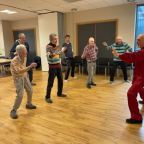
Estrogen and Aging: Managing Hormonal Changes as Men Get Older
As men get older, their hormone levels change, including decreasing levels of testosterone and increasing levels of estrogen. This shifting hormonal balance can lead to various effects on men's health. Understanding these changes is key to managing health and vitality with age.
What Causes Estrogen Levels to Rise with Age?
All people naturally produce some estrogen, although women make much higher levels. In men, small amounts of the enzyme aromatase in tissues converts testosterone into estrogen. Aromatase activity typically increases with age, converting more testosterone into estrogen. Fat cells also produce some estrogen, so added weight gain can increase estrogen.
Other factors that reduce testosterone also allow estrogen levels to comparatively rise. The testes produce less testosterone, and production pathways in other tissues become less efficient. As the body makes less testosterone, proportionately more estrogen circulates.
Effects of Rising Estrogen Levels
In the short term, higher estrogen improves bone strength and cholesterol profiles. However, chronically elevated levels can lead to troubling effects, including:
- Gynecomastia: breast tissue growth. This can cause men significant mental distress and anxiety over bodily changes. There are medications that can slow or reverse breast tissue growth in some cases.
- Decreased muscle mass. This contributes to overall weakness, fatigue, and reduced strength for daily activities. Certain exercises focus on maintaining muscle like lifting weights as men age.
- Increased body fat. Gaining belly fat and weight not only impacts appearance and self-confidence but also directly leads to more estrogen conversion from fat cells. A nutrition plan high in vegetables, lean proteins, and healthy fats can help mitigate fat accumulation.
- Reduced sex drive. Diminished libido can strain intimate relationships in addition to mental health effects like embarrassment or shame regarding sexual function changes. However, being open about this issue with your partner and doctor is important for finding solutions.
- Erectile dysfunction. The inability to achieve or sustain erections can occur along with a flagging sex drive leading to less sexual satisfaction. Medications, devices, and sometimes counseling on self-image may improve erectile function.
- Mood issues like depression. Hormone shifts can directly impact mood regulation leading to negative feelings or even clinical depression. Getting enough rest, social connection, and speaking to a mental health professional can help manage emotional changes.
Managing Estrogen Levels
Lifestyle approaches provide safe, sustainable ways to manage estrogen levels and related effects of aging:
- Exercise boosts testosterone while burning fat cells that produce estrogen. Weight training is particularly effective. Compound lifts like squats and deadlifts are great for increasing testosterone.
- Healthy diet and nutrition reduce fat gain while providing key nutrients to support hormonal balance. Eating more healthy fats like avocado, nuts and olive oil provides building blocks for hormones.
- Stress reduction helps regulate hormone pathways disrupted by high stress levels. Practices like meditation, yoga, or just going for a walk can activate the parasympathetic system and reverse high cortisol.
- Limiting alcohol avoids further altering hormone levels. Alcohol can allow estrogen levels to rise while reducing testosterone. Just a couple of drinks a week is enough to impact hormones significantly.
Impacts on Testosterone
Rising estrogen levels directly impact testosterone levels in multiple ways. The enzyme aromatase that converts testosterone into estrogen becomes more active. Higher overall estrogen signals the brain to reduce stimulation of the testes to produce testosterone. Fat cells encouraged by estrogen accumulation also produce enzymes that directly break down testosterone. Luckily, you can boost test while blocking estrogen by way of a supplement.
With treatments, men can help rebalance hormones for improved vitality. However, lifestyle approaches should provide the foundation for healthy aging. Key steps like staying active, reducing stress, and eating well help men minimize rises in estrogen while supporting natural testosterone levels across lifespans.
Monitoring aging effects and tweaking approaches collaboratively with medical professionals can further support positive outcomes.













